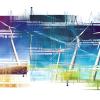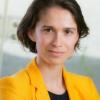
The Global Tipping Points Report – the most comprehensive assessment of tipping points ever conducted – highlights that humanity is currently on a disastrous trajectory. In this webinar several of the report section leads will present key insights from this publication.
The Global Tipping Points Report is led by Tim Lenton from the University of Exeter’s Global Systems Institute with the support of more than 200 people from over 90 organizations in 26 countries. The report aims to provide an authoritative assessment of the risks and opportunities of both negative and positive tipping points in the Earth system and society.
Presentations:
- Intro by moderator Laurie Laybourn Langton (University of Exeter)
- Earth System Tipping Points David Armstrong McKay (University of Exeter/Stockholm Resilience Centre)
- Tipping Points Impacts Steven Lade (Australian National University/Stockholm Resilience Centre) and Jonathan Donges (Potsdam Institute for Climate Impact Research)
- Governance of Earth System Tipping Points Manjana Milkoreit (University of Oslo)
- Positive Tipping Points in Technology, Economy and Society: Steve Smith (University of Exeter) and Caroline Zimm (IIASA/Earth Commission)
- Q&A moderated by Laurie Laybourn Langton (University of Exeter)
Please click here to register.
A recording will be available after the event.
About this webinar series
The Tipping points discussion series supports efforts to increase consistency in the treatment of tipping elements in the scientific community, develop a research agenda, and design joint experiments and ideas for a Tipping Element Model Intercomparison Project (TipMip). It is a joint activity of the Analysis, Integration, and Modeling of the Earth System (AIMES) global research project of Future Earth, the Earth Commission Working Group 1 Earth and Human Systems Intercomparison Modelling Project (EHSMIP) under the Global Commons Alliance, and the Safe Landing Climates Light House Activity of World Climate Research Program (WCRP). IIASA co-hosts the scientific secretariat of Working Group 1 of the Earth Commission and is one of the organizers of these events.
Further information about the series is available here.
Upcoming Events
Potsdam Institute for Climate Impact Research (PIK) & Online
German IIASA Networking Event: "Systems analysis for a sustainable and peaceful future"
Online and Austrian Academy of Sciences (Doktor-Ignaz-Seipel-Platz 2, Vienna)
Human Agency to Navigate the Anthropocene
Humboldt University of Berlin
